The number of hotel tech solutions related to guest communications continues to expand on the market. Which services are likely to become a standard? What type of benefits can they bring to your business?
The number of available options can become overwhelming and take the joy out of a journey that should be an exciting one. After all, it is all about bringing cutting-edge technology to hotels, benefiting guests and staff.
To help hoteliers navigate the available options, we collated data from the hospitality industry reports as well as HiJiffy insights in order to map out ongoing and upcoming trends in guest communications. We hope it empowers hospitality decision-makers to choose digital solutions with more confidence.
In this article, we explore the following six ongoing and emerging trends in guest communications in 2023:
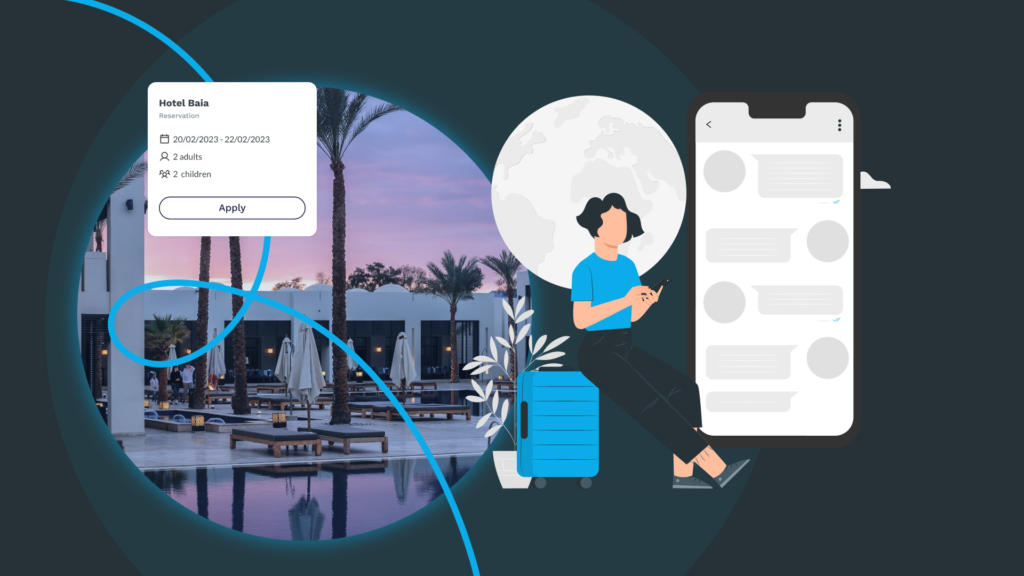
Further digitalisation of communication: Self-service through automation and contactless technologies
We are increasingly taking our lives online, and the digitalisation of many of our everyday processes has made using these technologies second nature for many of us worldwide. Offering digital services within the hotel industry brings several benefits that guests will undoubtedly appreciate.
You can expect this trend to be on everyone’s radar as “adopting innovative technological and digital solutions to improve daily operations (…)” is one of the key recommendations made by the World Travel & Tourism Council and European Travel Commission (2022) for the governments and private sector to address 1.2 million staff shortages in the industry.
Automation: addressing staff shortages
By offering guests the ability to communicate with the hotel during their stay through apps or other digital channels, you are making it more convenient for them and reducing the demand on your staff. Queues will be shorter, and satisfaction levels will be higher for both those who opt-in for the digital services and those who still prefer to use more traditional methods of communicating with your staff and making their reservations. The Oracle report (2022) also stated that 36% of hotel guests prefer a fully contactless, digital service with staff available only on demand. It works both ways, as staff members have fewer customers to deal with, so they can give their full attention to those who do need in-person care. The level of service is improved all around as everyone contacts your staff in the way they choose.
These new digital technologies allow for greater automation of not only communications but also tasks, enabling guests to serve themselves further. By automating regular processes and allowing guests to easily complete tasks themselves, such as making, altering, and cancelling bookings and reservations, as well as checking in and out, you are freeing up staff to excel in other areas. You can then focus on adding the human touch just where it is needed rather than focusing on the regular, mundane tasks that these days, with the right system in place, are more easily automated.
Contactless: time-saving and convenience
Whether visiting for business or leisure, travelling can be tiring and does not always go to plan. By offering a quick and easy check-in to a hotel via digital channels, you are cutting out waiting in line and time-consuming form filling. By implementing digital door keys, guests can even proceed directly to their rooms, unlocking the doors with a mobile phone app. It is the perfect solution for busy travellers and has the added value of being contactless. A survey by Oracle (2022) reported that since the pandemic, 65% of people prefer hotels that use technology to limit the interaction needed with hotel staff. These contactless digital solutions can make life easier for your guests, with the opportunity to order room service via a chatbot or book a spa treatment online. This, in turn, increases revenue for your business. Make a process simple, and more people are likely to use it. With contactless services readily available, should social distancing measures need to be brought in suddenly, you can quickly adapt your processes to comply with any rules and regulations that may be announced and ensure the safety of all your guests. Procedures that can be put into place quickly, easily, and at no extra cost because you already have the system installed and ready to go. This system is scaleable for any potential increase in traffic due to the rise in demand for contactless service.
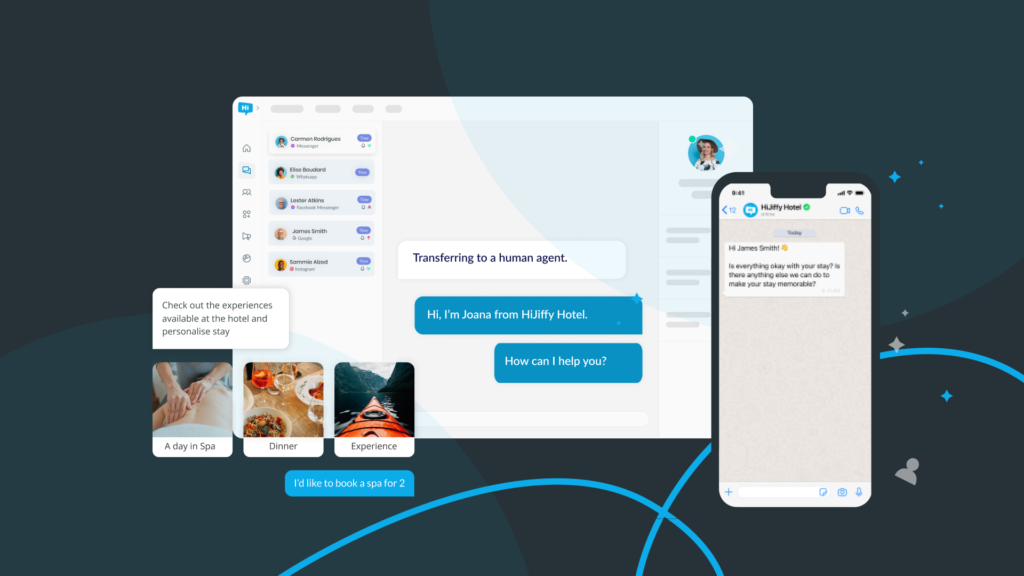
Personalisation and tailored communication: Hyper-relevance on guests’ preferred channels
Personalisation has been a growing trend over the last few years, which is set to continue throughout 2023. In the Digital Transformation Report published by Skift (2022), delivering personalised services and messaging is recognised as the key strategy for boosting marketing and advertising effectiveness. Personalisation is directly linked to improved guest satisfaction. By effectively gathering data and then putting it to beneficial use, you can tailor the service each guest receives to match their individual requirements and preferences better.
From simply using the guest’s name in correspondence to offers that are most likely to match their demographic, there are many ways in which you can add aspects of personalisation into your business processes. By making data-driven decisions such as offering a ‘kids eat free’ deal only to families, you can target your special offers where they are most likely to be successful and not overwhelm guests with offers that are irrelevant to them.
Opportunities across the entire guest journey
You will be able to offer the most accurate personalisation by collecting the right data and using AI technology to effectively process it and help you to put it to the best use. The hotel guest journey brings several opportunities both to gather data for the personalisation processes and to deliver tailored communications such as upselling and extra services that the algorithm decides are most likely to result in a conversion. From pre-stay to post-check-out, every part of the guest journey should be addressed regarding personalisation opportunities. By utilising the guest’s preferred communication methods, you are more likely to engage with them and encourage them to pre-book extras before their stay, leave a review, or fill out your customer satisfaction survey after their visit.
The ultimate aim of personalisation is to make the guest feel special and unique, as if the service is tailored to them. We talk about adding a personal touch, which is what we do when we personalise hotel services. By using their chosen channel of communication, you can enable guests to contact you as they would a friend or family member. For example, if your guest prefers to use WhatsApp for their communications, your system could automatically link the booking to a WhatsApp conversation directly with the hotel management system. Here guests can ask questions or make dining or spa reservations without making a phone call or taking a trip to reception. Of course, this is also a fantastic way to distribute upsell messages and request feedback.
The right message on the right channel
The key to personalisation is the realisation that everyone does things differently and has diverse needs and preferences. These days, with so many technological advances, we do not need to try and find the best single option that will suit most people. We can use technology to deliver a personalised service to every guest, so their preferences are taken into account in various ways. From knowing in advance about regular guests’ room preferences to identifying their chosen methods of communication to be used throughout their stay, this tailor-made service with a high level of attention to detail is set to transform the hospitality industry. We already know that every guest is unique, but now we have the technology to discover the wants and needs of every guest and integrate this data into the service we provide. Personalisation techniques result in offering a superior service that satisfies your guests’ desires, but it additionally puts opportunities of interest at the fingertips of every guest, boosting sales of complementary services such as spa treatments, room upgrades, and in-house dining, which can add significantly to the final bill, and so considerably boost your profits. Simply put, by knowing what your guests want, you can offer it to them, and by tailoring what you offer, the deals and services that will be most appreciated will not be lost in the noise of a multitude of advertisements and offers.
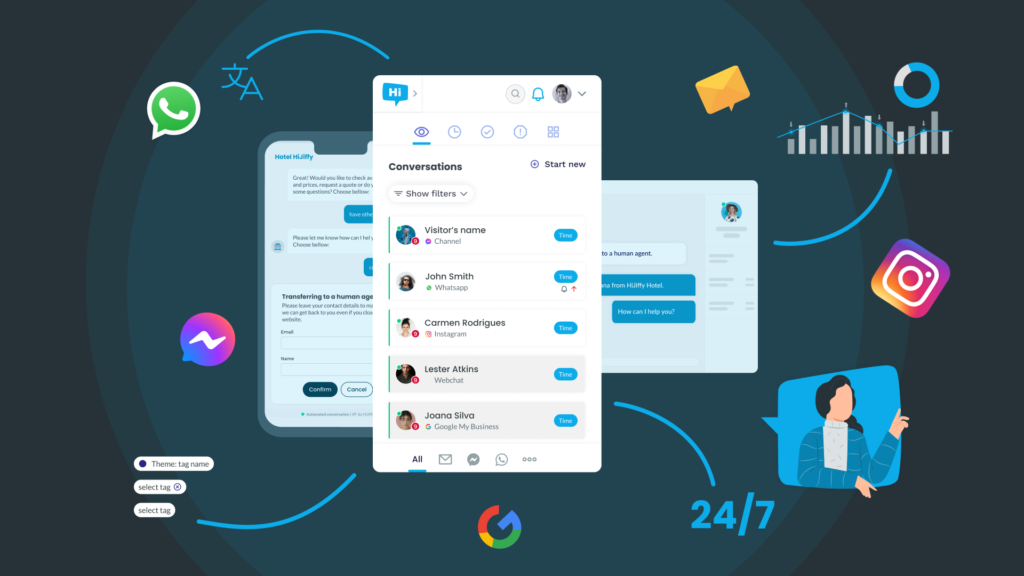
Conversational Artificial Intelligence: Reimagining guest communications
Traditional chatbots have been used in the industry for a while, but now we step into the era of conversational AI revolutionising guest communications. Using advanced Artificial Intelligence and machine learning technologies, these powerful tools can deal with many guest queries and services, communicating with guests in a friendly, efficient, and intuitive manner. According to Oracle’s study of guest habits and attitudes (2022), 67% are interested in hotels that use AI to provide more relevant offerings. In other words, most guests have already embraced this advanced technology.
Supporting your staff while serving your guests
With staff shortages currently being an issue across the entire industry (European Travel Commission, 2022), supporting your reservation and reception teams with smart technology takes the strain off during busy times and reduces the workload of day-to-day operations. It also adds an extra layer of protection against any unexpected future shortages. No guests want to queue long, and none of your staff members want to be rushed off their feet. HiJiffy insights show that hotels using specialised conversational AI specialised in the hospitality industry, on average, report successful automation levels of over 80% of the queries received. The system can also seamlessly direct the person to a human operator for the minority of calls that cannot be dealt with by the automated system. This means that staff members only work on calls when their expertise and specialised knowledge are required. The bulk of the incoming queries are quickly, efficiently, and entirely satisfactorily handled by the AI, with no human intervention necessary at all.
Elevated technology evolving with every conversation
The most advanced conversational AI solutions in hospitality have the capacity to self-learn, constantly improving their efficiency and accuracy with time. AI-powered chatbots are able to converse with guests, record any information given, and access databases to offer a reliable, personalised service. The best solutions seamlessly integrate with other hotel management systems, opening up possibilities for bookings to be made, confirmed, altered, or cancelled. All information is conveyed as a real conversation that flows as if you were talking to a human agent. The system is intuitive and intelligent, and communication feels natural. A user simply voices their request, query, or concern and the chatbot responds accordingly, eliminating long-winded menus and a great deal of frustration that historically arose from using less advanced chatbot solutions.
Key benefits and beyond
Conversational AI is also incredibly good at gathering the data you require. Even the best-trained agents can find it challenging to ask just the right questions to collect high-quality data, while AI is programmed to identify and filter that data. Additionally, with all conversations being recorded, they also become searchable and the data itself can be analysed to discover patterns, highlight keywords, and provide vital insights such as the volume and theme of incoming queries.
When considering implementing an intelligent, conversational guest communications solution, look for one that can successfully answer queries in multiple languages. Very few hotels will have multilingual staff on hand 24/7 just in case there is a call from overseas, but with a conversational AI system in place to handle customer queries, this is all dealt with automatically.
Make sure to look for AI-powered guest communication systems that integrate with all social media and messaging platforms. This could allow your business to offer communication options that you have not been able to provide in the past, and in addition, the speed of reply will be instant. There is no need for a user to wait for an operator or staff to find time in their busy schedule to reply to a text message enquiry. This speed of service and versatility of communication options can really sway the balance when a potential guest is checking out their options.
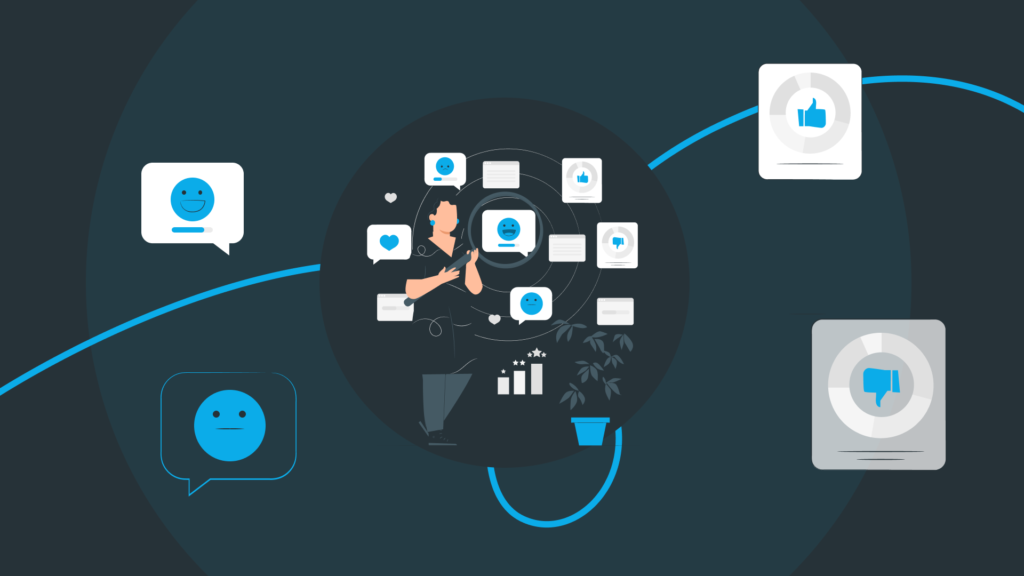
Artificial Intelligence and machine learning are becoming increasingly sought-after within the hospitality industry, being implemented to help answer customer queries and automate processes. But the most advanced of them can now go even one step further and actually recognise the guest sentiment. It is perhaps one of the most subtle yet vital aspects of hospitality that can significantly impact customer satisfaction when these observations are put to good use. Skift (2022) reports that hoteliers already recognise sentiment analysis as the most practical application of AI and machine learning, even more than personalising offers or automating customer service steps.
Identifying where the response time is critical
Most hotels will regularly have a high volume of incoming messages in their inbox, and it is not always apparent from a glance at the subject lines exactly what each email is about. Fail to respond to an urgent question, and a potential guest could decide to book elsewhere, but how do you spot that time-sensitive query buried deep within your inbox? This is where sentiment analysis comes in, processing the correspondence’s language to identify the message’s sentiment. It can highlight the most urgent queries allowing the staff to order messages by importance. This way, you can address a complaint quickly and put the problem right. This process makes prioritising simple and ensures that the most urgent issues are dealt with first.
Keeping a finger on the pulse
And this is just the start. Sentiment analysis does not have to be confined to your in-house systems or your emails. It can be implemented across many channels, not least of which is social media. By using sentiment analysis to keep a close eye on sentiments conveyed over your social media accounts, you can stay ahead of the messages that are being put out there about your business. You will know if your hotel restaurant is receiving excellent reviews, and if a negative comment is posted, you can be right on it, solving the problem and showing the world that your hotel is quick to react and put things right. When you have the information on the aspects of your hotel that guests love and those lacking, you can make changes and improvements that really count. You can react quickly to comments, engage with the public, and showcase great customer service. With good sentiment analysis tools, you can eliminate hours poring over spreadsheets and get your information in real-time, so you can respond when relevant, not hours or days after the fact.
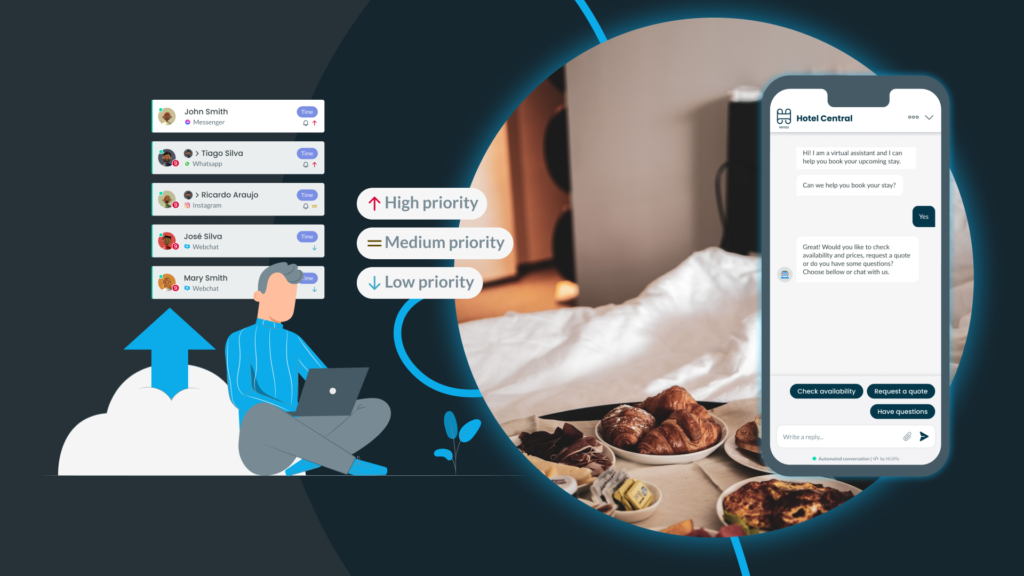
Streamlining all communication channels: One inbox should be exactly enough
In their 2022 Digital Transformation Report, Skift, the travel industry’s largest intelligence platform, stated that streamlining communication channels was the top digital strategy for customer service initiatives. The number of ways people communicate keeps growing, and keeping track of it all can feel like an impossible task. Some businesses decide to narrow down the methods of communication that they use to offer a good service across a few platforms. However, by doing this, they are missing out. Spend all your time ensuring your Facebook page is active and engaging, and you may miss that person reaching out to you on Twitter, or that Instagram user who looked for your account but could not find one, leading them to doubt the legitimacy of your business.
An omnichannel inbox centralising all communication
You have probably determined that it is essential to reach your guests and potential guests across as many platforms as possible, but this comes with a significant challenge – each of the platforms needs to be managed individually, and the volume of incoming messages keeps growing. This task may quickly become overwhelming unless you have an unlimited workforce and endless funds. Fortunately, technology has now given us the tools to fully streamline and centralise access to all our communications and social media channels.
It is an invaluable tool to ensure you are always fully engaging across all platforms. Individual message threads can be flagged to ensure conversations are followed through to their conclusion. You will not have to rely on memory, or your own notes, to follow up on an issue. You will also have many timesaving features available to you, such as being able to reply directly from the interface rather than having to log in and out of the respective channels and picking from your personalised range of pre-filled responses for common queries.
Often, someone other than the person handling the correspondence ultimately deals with the issue. A centralised system makes it easy to pass individual tasks on to other staff members, so the right person can quickly deal with the query.
More complete data insights
Gathering messages from all your communication channels in one place allows you to view interactions and messages at a glance, regardless of where they originated. Dealing with your communications can be made even easier with useful built-in tools such as automatic translation and prioritising using AI-powered sentiment analysis. With all your data in one place, you will also be able to take advantage of the invaluable insights, reports, and metrics generated when all this combined data is analysed. It becomes easy to answer questions such as which platforms are used most often to contact your business, average response times to queries, and much more.
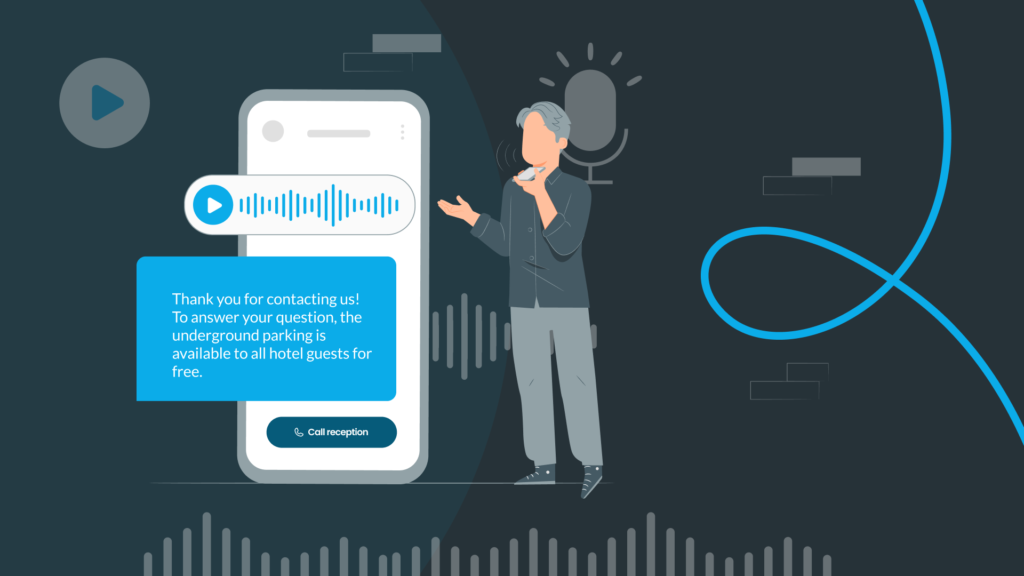
Voicebots and Interactive Conversational Voice Response Systems: Letting Artificial Intelligence speak
The fifth HOTREC Hotel distribution study (2022) showed that direct bookings with hotels are rising. With more guests choosing to book direct, offering a great responsive service across all communication channels, including over the phone and through voice notes on social media and messaging apps, is even more vital. The latter has gained in popularity, with as many as 7 billion voice notes sent on WhatsApp every day, according to TechCrunch (2022). It may be that a guest ultimately makes a booking online, but if they have a particular question regarding the facilities, the location, or to make a particular request, these questions are often asked over the telephone or a voice note.
Forgetting the menus and getting straight to the point
If a potential guest receives a busy tone because you are on another call, or worse, the phone is not answered because all your staff members are occupied elsewhere, you could lose a customer. Similarly, unanswered voice messages on communication platforms can quickly pile up – listening to them by staff and taking note of essential details is time-consuming. You may have an automated voice system with menus to navigate through already in place. Such a system can quickly become ineffective when the user is forced to listen to options that are irrelevant to their enquiry. Many people simply hang up when greeted by an automated menu.
The key solution is to effectively use modern, high-tech voicebots that use AI for advanced interactive voice response. By introducing more natural language, and a deeper understanding of voice responses, customers can have their questions answered or be automatically redirected to the relevant department without having to listen to a string of menu options. Many simple queries, such as asking about restaurant opening times or being transferred to the spa to book a treatment, can all be taken care of without taking up the time of the reception staff. This frees up staff to answer the more complex queries and deal with those guests who are there in person. This is invaluable at busy times and allows more guests to receive a high level of customer service simultaneously.
The sound of seamlessness
This type of self-service contact is a realistic option that can answer the vast majority of customer queries and interact with backend systems so users can access services without having to be put through to a human operator. Giving callers the ability to complete simple transactions such as making bookings, amending dates, or making dinner reservations massively takes the strain off staff answering calls. Why add to your staff’s workload to deal with these requests when an automated system will do it just as well? In addition, by implementing an AI system to take care of these processes, you are eliminating human error and have full traceability should an issue need to be revisited. We have now reached an era where we can put aside our preconceptions of voicebots. The technological world has transformed what was once a source of frustration that offered only minimal usefulness for redirecting callers to different departments or providing the most basic of information, into a fully interactive voicebot that understands the fine nuances of language and tone of voice, providing access to a wide range of services. For the guests, it is stress-free, quick, and accessible. For hospitality businesses, it is a considerable time and money saver with some invaluable analytics capabilities built in.
Summary
Based on the industry data and studies, as well as our own insights, we expect these hospitality guest communications trends to become more prominent as we move into 2023 and beyond. As with all new technologies, the early adopters will get a head start, so it is recommended to keep an eye on developing platforms that could benefit your business in this digital age. By understanding the trends, keeping an open mind, and knowing what will be most helpful to your hospitality business, you will be ahead of the competition and able to offer your guests a level of service that is a cut above. These are exciting times as Artificial Intelligence and machine learning processes move from being a novelty to being an incredibly useful tool with many valuable real-world purposes, and the hospitality industry can certainly benefit from this. We certainly look forward to the advances over the next year and beyond and the innovations that will further transform our industry.
At HiJiffy, our mission is to better connect hotels with their guests by developing the most advanced conversational AI for hospitality. It means we not only follow and respond to trends in guest communications but also contribute to shaping the technological landscape in hospitality by innovating our solutions and reimagining guest communications with hoteliers.
Sources








